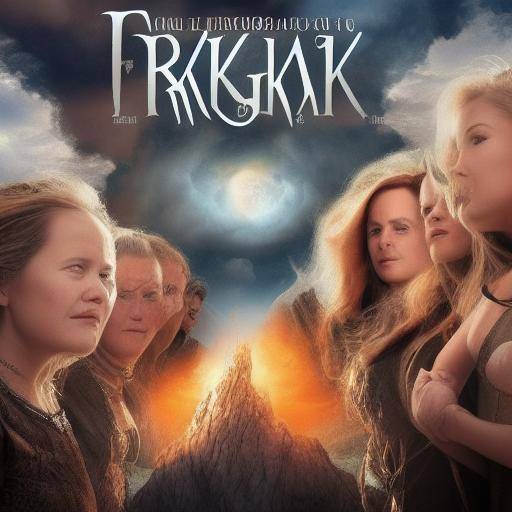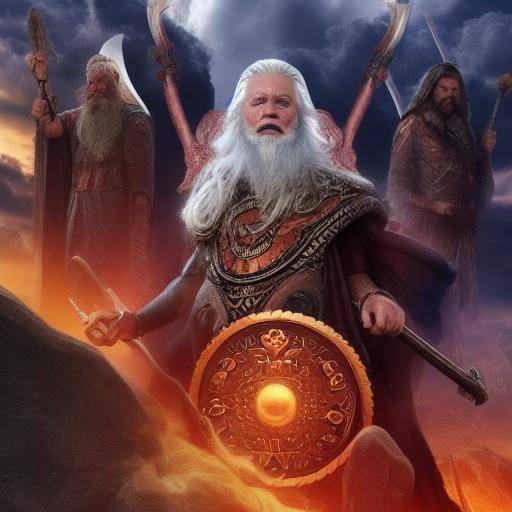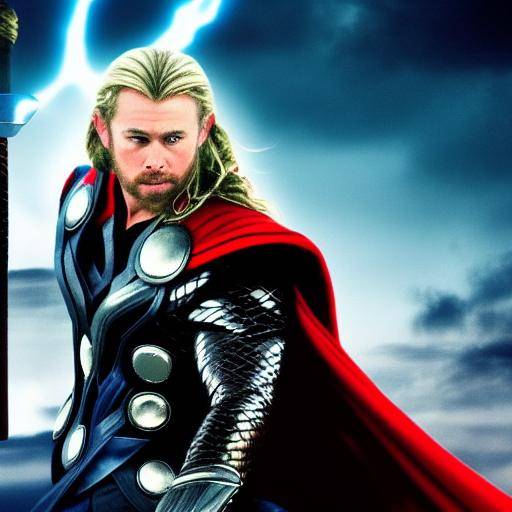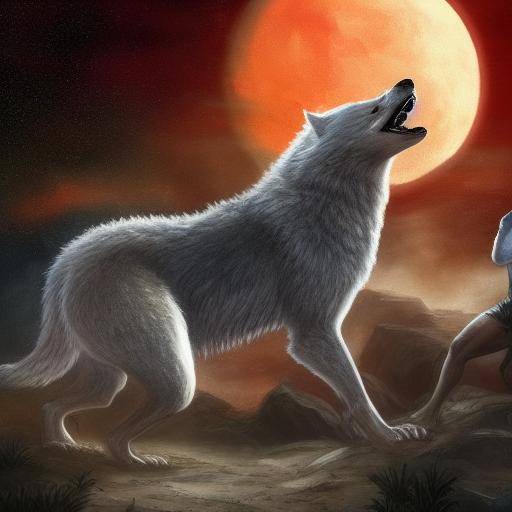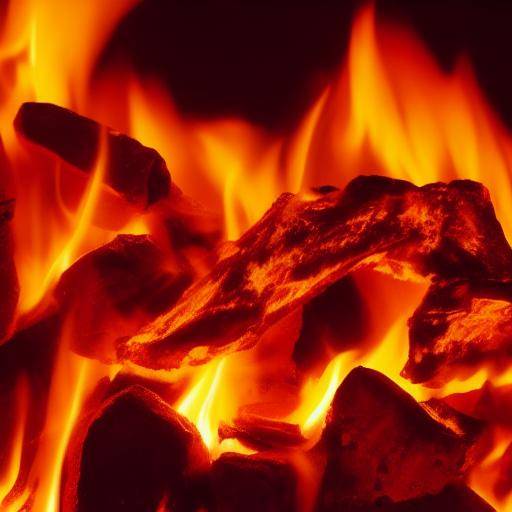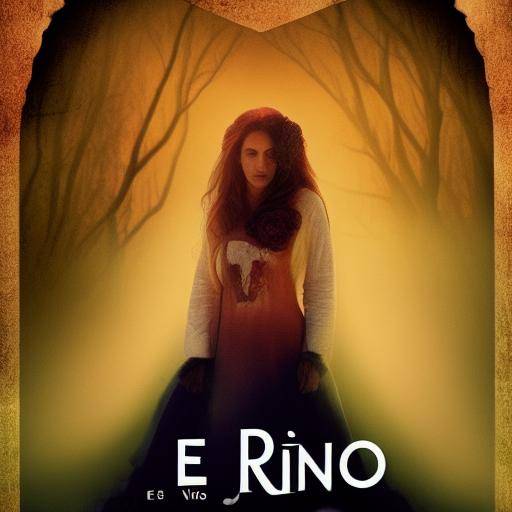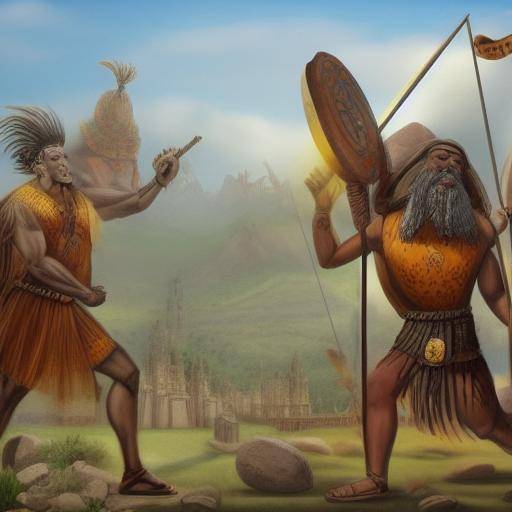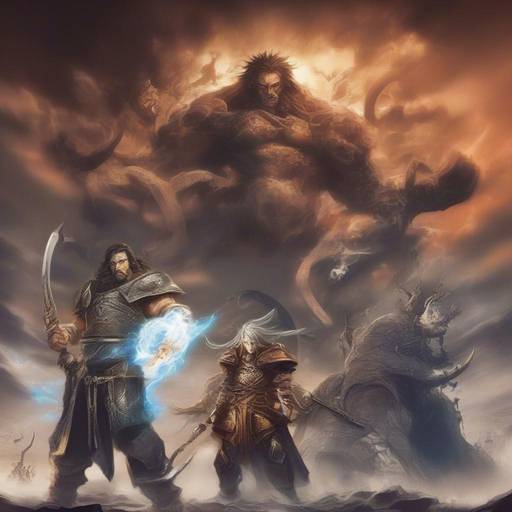
The Ragnarök is one of the most fascinating and terrifying prophecies within the Nordic mythology. This apocalyptic event, known as the "Fin de los Tiempos", has captured the imagination of many cultures throughout history and inspired numerous literary, artistic and cinematic works. In this article, we will explore in depth the Ragnarök, the Nordic myths and the associated prophecy, providing a detailed view of its origins, historical meaning, implications today, interpretations, comparisons and much more. Join us on this fascinating journey through Nordic mythology!
Introduction
The Ragnarök is an apocalyptic prophecy described in ancient Nordic myths as a devastating cosmic event that marks the end of the known world and the beginning of a new era. Over the centuries, this vision of apocalypse has captivated people from different cultures, generating a rich tradition of narratives about the end of time. In this article, we will explore in detail the prophecy of Ragnarök, its origin in the Nordic myths and its relevance today.
History and Origins
The Nordic myths, also known as Scandinavian mythology, have their roots in the religious and cultural beliefs of the Germanic peoples who inhabited the regions of Scandinavia during the Viking era. These mythical stories were transmitted orally from generation to generation before being recorded in writing in the famous Eddas and other Icelandic sagas. The Ragnarök presents itself in these sources as an inevitable catastrophic event, marked by the confrontation between gods and monstrous beings that culminates in the destruction of the nine worlds and the creation of new ones.
The concept of Ragnarök reflects the cyclical conception of time in Nordic mythology, where the end of a cycle is followed by a new beginning, thus maintaining the balance of the cosmos. The epic accounts describing the Ragnarök, such as the "Poetic Edda" and the "Prosaic Edda", detail a set of events that include titanical battles, natural cataclysms and the disappearance of mythical gods and creatures. Beyond its apparent fatalism, the Ragnarök also encloses the seed of hope, as it opens the possibility of renewal and regeneration, symbolizing the eternal struggle between order and chaos.
Detailed Analysis
The Ragnarök represents a deeply rooted theme in the collective psyche, giving rise to reflections on the human condition, the nature of the time and the sense of existence. From a symbolic perspective, the Ragnarök can be interpreted as a metaphor for the challenges and adversities we face throughout our lives, as well as an invitation to consider the impermanence of all things. By deep exploring these interpretations, we can discover valuable lessons about resilience, acceptance of the inevitable and the search for meaning in turbulent times.
Comprehensive review
The Ragnarök, in its role as a catalyst for philosophical and existential reflections, offers a rich ground for the exploration of fundamental subjects such as destiny, free will, morality and human nature. Through a comparative analysis of various interpretations of the Ragnarök, we can appreciate the diversity of approaches that this myth has provoked throughout history and the different cultures that have adopted it as part of their spiritual and intellectual heritage.
Comparative analysis
The Ragnarök shares thematic similarities with other visions of the end of the world present in different cultural and religious traditions. Through a comparative analysis, we can identify parallels and contrasts between the Ragnarök and other apocalyptic narratives, thus enriching our understanding of the universal concerns that have driven human imagination throughout history.
Practical Tips and Accessible Recommendations
Despite its mythical and transcendental character, Ragnarök can also offer practical teachings and valuable tips for daily life. By exploring the values and lessons imparted by this myth, we can discover guidelines for facing challenges, making meaningful decisions and cultivating the inner strength necessary to confront the moments of crisis and change.
Industry Perspectives and Expert Reviews
The impact of Ragnarök on contemporary popular culture is undeniable, manifesting itself in a wide range of artistic, literary and cinematographic expressions. In addition, the myth has been the subject of academic and critical analysis, generating diverse debates and interpretations. By collecting the opinions of experts in fields such as comparative mythology, literature, psychology and anthropology, we can obtain a more complete view of the influence of Ragnarök in the cultural and academic sphere.
Case Studies and Real Life Applications
The resonance of Ragnarök in the human mentality is manifested in various contexts of everyday life, from artistic and literary expressions to the management of organizational change and trauma psychology. Through case studies that examine these practical applications of the Ragnarök myth, we can illustrate their relevance in fields as varied as literature, psychology, management of business change and community resilience.
Future Trends and Predictions
As the Ragnarök continues to play a significant role in contemporary culture, it is important to anticipate and analyse future trends, as well as the new interpretations and reinventions of myth in a changing world. In considering the projections and predictions on how the Ragnarök could resonate in society and culture in the future, we can prepare ourselves to appreciate and understand its continuing evolution in the collective imagination.
Conclusion
The Ragnarök, as an apocalyptic myth of powerful cultural and symbolic resonance, invites us to reflect on the nature of time, destiny and renewal. In his epic account, we find a mirror of our own struggles, challenges and hopes, which gives us the opportunity to understand more fully the complexity and beauty of the human condition. As we explore the many layers of meaning of the Ragnarök, we immerse ourselves in an epic journey that awakens our imagination and inspires us to reflect on our own ends and new beginnings.
FAQs
What is Ragnarök in Nordic mythology?
The Ragnarök is an apocalyptic prophecy of the Nordic mythology that describes the end of the times and the beginning of a new era, marked by cosmic battles and cataclysms.
What is the origin of the Ragnarök myth?
The myth of Ragnarök has its roots in the religious and cultural beliefs of the Germanic peoples who inhabited the regions of Scandinavia during the Viking era. These mythical stories were transmitted orally and subsequently recorded in writing in the Eddas and other Icelandic sagas.
What is the role of Ragnarök in Nordic mythology?
The Ragnarök represents a moment of cosmic destruction and renewal, symbolizing the eternal struggle between order and chaos in the cyclical conception of the time of Nordic mythology.
How does Ragnarök relate to other apocalyptic accounts?
The Ragnarök shares thematic similarities with other visions of the end of the world in different cultural and religious traditions, being the object of comparative analysis to understand these narratives more broadly.
What lessons can we draw from the Ragnarök myth for everyday life?
The Ragnarök, beyond its mythical nature, offers practical teachings on resilience, acceptance of the inevitable and the search for meaning in turbulent times, providing guidelines for facing challenges and cultivating the inner strength needed to face moments of crisis and change.
What is the influence of Ragnarök in contemporary culture?
The Ragnarök has left a profound mark on contemporary popular culture, manifesting itself in a wide range of artistic, literary and cinematographic expressions, as well as in the academic sphere, generating diverse debates and interpretations.
In conclusion, Ragnarök is much more than apocalyptic prophecy. It is a story that crosses the barriers of time and culture, enriching the collective imagination and offering timeless teachings about human nature and the future of the universe. In exploring its nuances, we immerse ourselves in a journey of reflection, learning and renewal that lasts throughout the ages, reminding us that, even in the midst of chaos, the possibility of a new beginning always opens.
With this enriched understanding of the Ragnarök, we hope that readers can appreciate the lasting value of this myth, as well as find inspiration to face the challenges of life with strength and hope.

